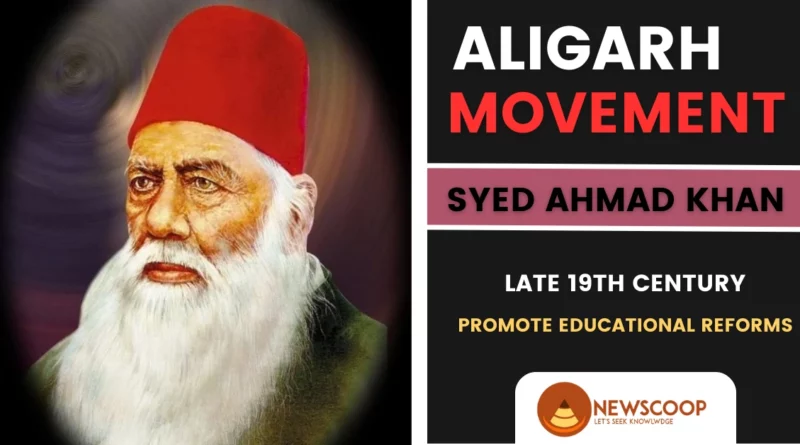Aligarh Movement of 19th Century by Syed Ahmad Khan
Aligarh Movement is a significant educational and social reform movement that emerged in the late 19th century, spearheaded by Sir Syed Ahmad Khan. This movement played a pivotal role in reshaping the course of Indian education, and its impact continues to resonate even today.
In this article, we will explore the key features, objectives, and achievements of the Aligarh Movement, which are essential topics for the UPSC exam.
What is the Aligarh Movement?
The Aligarh Movement was a significant socio-religious reform movement initiated by Syed Ahmad Khan (1817-1899) in British India. It aimed to address the educational and socio-economic challenges faced by the Muslim community during that time. The movement emphasized the importance of Western education and government service for Muslims to adapt to British rule and advocated for social upliftment, religious harmony, and the promotion of modern education.
It led to the establishment of the Muhammadan Anglo-Oriental College, later known as Aligarh Muslim University, which became a center of educational excellence for Muslims in India.
Objectives of the Aligarh Movement
The Aligarh Movement had the following objectives:
- Promote educational reforms among Muslims and encourage the pursuit of Western education.
- Address socio-economic challenges faced by the Muslim community in British India.
- Strive for a synthesis of Islamic teachings with modern knowledge and practices.
- Advocate for social equality, women’s education, and reforms in practices such as polygamy and purdah.
- Foster a sense of cultural identity and pride among Muslims while embracing contemporary norms.
- Establish institutions like the Muhammadan Anglo-Oriental College (later Aligarh Muslim University) to provide modern education for Muslims.
- Encourage Muslim participation in administrative and government services.
- Spread progressive social beliefs through publications like Tahdhib-ul-Akhlaq.
- Challenge regressive social customs and promote progressive values within the Muslim community.
- Influence the intellectual and political discourse of the time, shaping the trajectory of Muslim political thought in India.
Leaders of the Aligarh Movement
- Sir Syed Ahmad Khan
- Nawab Mohsin-ul-Mulk
- Maulana Shibli Nomani
- Hakim Ajmal Khan
Historical Background of the Aligarh Movement
The Aligarh Movement emerged against the backdrop of the 1857 revolt, where Muslims were viewed as the main conspirators by the British. This perception was reinforced by the activities of the Wahabis. However, the British later saw the potential of using Muslims as allies against the rising nationalist sentiment represented by the Indian National Congress.
In this context, a group of Muslims led by Syed Ahmed Khan saw an opportunity to secure official support for the betterment of Indian Muslims. They believed that by focusing on education and employment opportunities, the Muslim community could experience growth and development.
Syed Ahmed Khan, a prominent Muslim leader, played a key role in this movement. He advocated for thoughtful concessions from the British administration to stimulate progress among Muslims. Moreover, his vision involved emphasizing education and employment as means to uplift the community.
Under Syed Ahmed Khan’s leadership, aimed to promote better education and create avenues for employment for Indian Muslims. It sought to harness official support to bring about positive change and opportunities for the Muslim community, fostering their growth and development.
Syed Ahmed Khan – Founder of Aligarh Movement
Syed Ahmed Khan (1817-1898) was a prominent Muslim leader, scholar, and social reformer in British India. He was born into a Muslim noble family and served as a loyal member of the British government’s judicial service. Syed Ahmed Khan played a crucial role in advocating for educational reforms and social upliftment among Muslims.
Moreover, he emphasized the importance of Western education, encouraged Muslims to adapt to British rule, and worked towards bridging the gap between Muslims and the administration.
Further, he founded the Mohammedan Anglo-Oriental College, later known as Aligarh Muslim University, which became a significant institution for Muslim education and progress. In addition, Syed Ahmed Khan’s efforts laid the foundation for the Aligarh Movement, which aimed to empower the Muslim community and promote harmony with contemporary society.
Initiatives of Syed Ahmed Khan
- Established the Scientific Society in 1862, aimed at translating English books on science and other subjects into Urdu.
- Founded an English-Urdu journal to disseminate ideas on social reform.
- Established the Mohammedan Oriental College, which later evolved into the Aligarh Muslim University.
- Focused on developing a modern mindset among students through educational initiatives.
- Known as a key figure in the Aligarh Movement, an intellectual and social reform movement.
- Advocated against social practices like the purdah system, polygamy, and the Muslim divorce system.
- Emphasized the need to remove irrational social customs while preserving the essence of Islam.
- Promoted a rational interpretation of the Quran.
- Worked towards improving women’s status through education, opposing purdah and polygamy, supporting easier divorce, and criticizing the Piri and Muridi systems.
Also Read: Quit India Movement
Conclusion
The Aligarh Movement, spearheaded by Sir Syed Ahmad Khan, stands as a remarkable chapter in India’s educational and social history. Its emphasis on education, social upliftment, and the synthesis of knowledge played a pivotal role in empowering the Indian Muslim community and fostering national integration.
The establishment of Aligarh Muslim University and the promotion of Urdu scientific literature were instrumental in shaping the future trajectory of Indian education. As UPSC aspirants, understanding the Aligarh Movement is essential to comprehend the socio-cultural dynamics of British India and the transformative impact of educational reforms.
Thank You!

